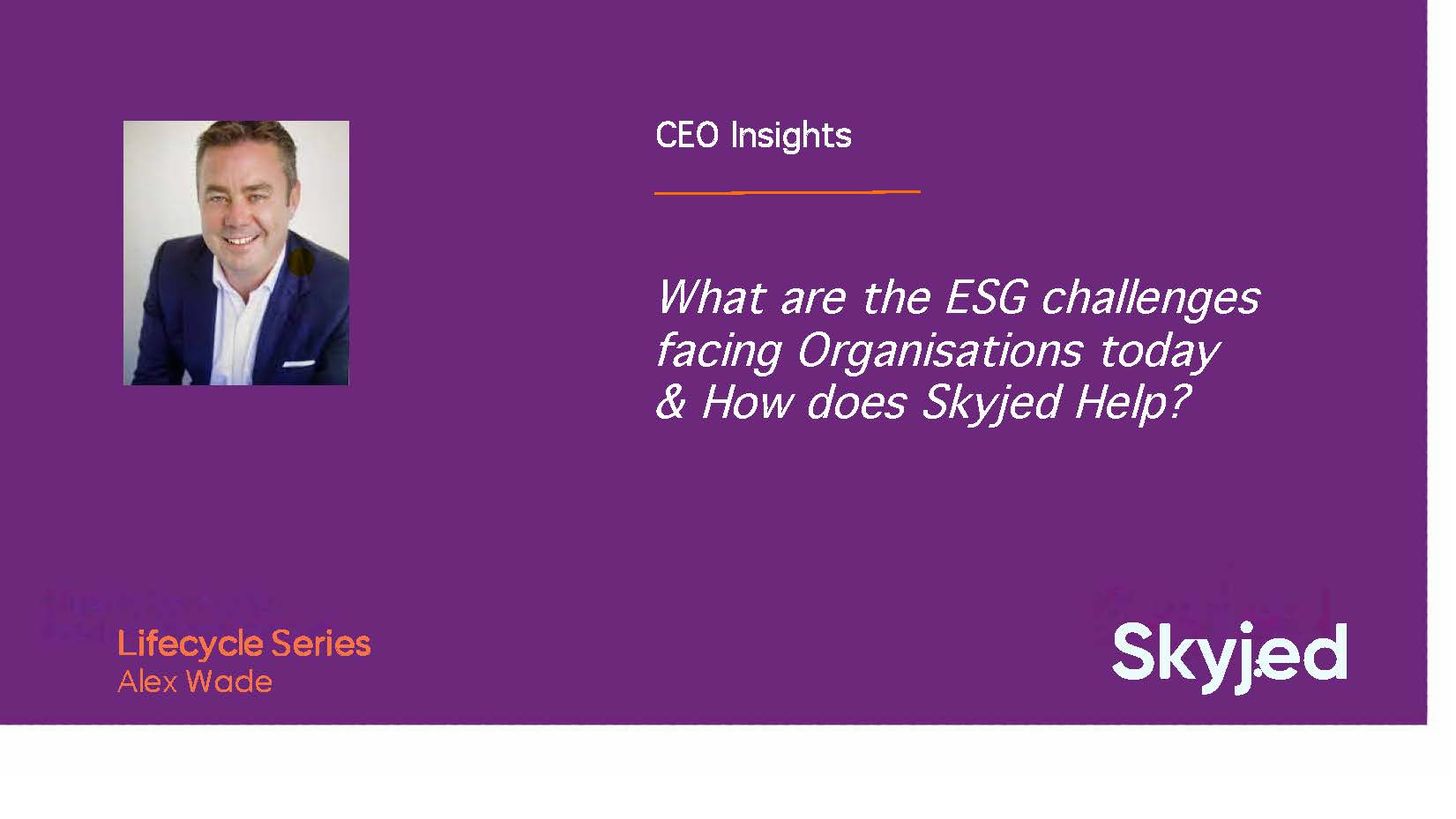What are the ESG challenges facing organisations today and how does Skyjed help
by Alex Wade

We see many organizations today facing several Environmental, Social, and Governance (ESG) challenges as they strive to integrate sustainability principles into their operations and improve processes going forward. Here are some common ESG challenges and how we, at Skyjed, can help address them. With Skyjed’s toolkit in ESG we can also assist in setting you up from scratch to navigate and address the way forward.
ESG Challenges Facing Organizations Today:
1. Data Management: Managing and integrating ESG-related data from disparate sources can be complex and time-consuming. Organizations often struggle with data quality, consistency, and accessibility, hindering effective decision-making and reporting.
2. Regulatory Compliance: Keeping up with evolving ESG regulations and reporting standards (e.g., TCFD, SASB, GRI) across different jurisdictions poses challenges. Organizations need to ensure compliance while navigating diverse regulatory landscapes and varying disclosure requirements.
3. Stakeholder Expectations: Meeting the expectations of diverse stakeholders, including investors, customers, employees, and communities, regarding ESG performance and transparency can be demanding. Balancing competing priorities and effectively communicating ESG efforts is crucial.
4. Risk Management: Identifying, assessing, and managing ESG-related risks such as climate change impacts, supply chain risks, and reputational risks is essential. Organizations need robust risk management frameworks to mitigate risks that could affect long-term sustainability and resilience.
5. Integration into Business Strategy: Embedding ESG considerations into core business strategy and decision-making processes requires alignment across departments and functions. Organizations must ensure that ESG goals are integrated with financial objectives and operational priorities.
6. Measuring Impact and Performance: Quantifying the impact of ESG initiatives and demonstrating tangible outcomes can be challenging. Organizations need reliable metrics and benchmarks to track progress, assess performance, and communicate achievements effectively.
How Skyjed Helps with ESG Challenges:
1. Data Management and Integration: Skyjed facilitates the management and integration of ESG-related data by providing a centralized platform. It aggregates data from various sources, including environmental impact metrics, social performance indicators, and governance practices, ensuring data consistency and accessibility for decision-making.
2. Regulatory Compliance Monitoring: Skyjed monitors regulatory developments related to ESG and helps organizations stay compliant with evolving standards. It tracks updates to disclosure requirements, facilitates compliance checks, and supports documentation management to ensure adherence to regulatory obligations.
3. Stakeholder Engagement and Transparency: Skyjed enhances stakeholder engagement by providing tools for transparent communication and feedback gathering on ESG initiatives. It facilitates alignment between internal ESG efforts and external stakeholder expectations, promoting transparency and trust.
4. Risk Assessment and Mitigation: Skyjed supports ESG risk management by enabling organizations to identify, assess, and mitigate risks across environmental, social, and governance dimensions. It helps track risk exposure, implement mitigation strategies, and integrate risk management into decision-making processes.
5. Performance Monitoring and Reporting: Skyjed offers robust analytics and reporting capabilities that enable organizations to monitor ESG performance metrics. It provides customizable dashboards and reports to track progress against ESG goals, measure impact, and communicate performance to stakeholders effectively.
6. Integration into Business Processes: Skyjed facilitates the integration of ESG considerations into business strategy and product lifecycle management. It supports setting ESG goals, aligning incentives, and embedding sustainability principles across organizational operations, fostering a strategic approach to ESG integration.
7. Continuous Improvement: Skyjed promotes continuous improvement in ESG practices by facilitating ongoing reviews, evaluations, and refinements based on performance insights and stakeholder feedback. It helps organisations adapt to emerging ESG trends, best practices, and regulatory requirements, driving sustainability innovation.
By addressing these ESG challenges with Skyjed’s capabilities in data management, regulatory compliance, stakeholder engagement, risk across all of the above facets, Skyjed supports organisations set up and achieve sustainable growth, fostering resilience, and creating long-term value for stakeholders in a responsible and transparent manner.



